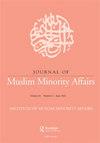德国大学中穆斯林的知识、虚假信仰和事实驱动的认知
IF 0.4
0 RELIGION
引用次数: 0
摘要
摘要本文研究了我们可以从我们的知识量表中预测的对穆斯林的积极和消极态度,无论是时尚的还是过时的。换句话说,对穆斯林的消极态度是否与虚假信仰密切相关。这项研究是一项更大规模研究的一部分,该研究对弗赖堡和德国其他五所大学的424名非穆斯林德国学生的态度进行了调查。结果表明,自发传达虚假信仰且知识水平低的参与者对穆斯林的负面态度比没有传达的参与者多。因此,可以想象,接受不正确的信息可能会形成对穆斯林的负面态度。根据这些发现,我们只能得出结论,在受过高等教育的学生中,偏见与穆斯林的知识程度或文化认知之间存在双向关系,但没有证据表明因果关系或重要性。本文章由计算机程序翻译,如有差异,请以英文原文为准。
Knowledge, False Beliefs and Fact Driven Perceptions of Muslims in German Universities
Abstract This paper examines what may constitute both positive and negative attitudes towards Muslims that we may predict from the scale of our knowledge, fashionable or well worn. In other words, are negative attitudes towards Muslim strongly correlated with false beliefs. The research was part of a larger study examining the attitudes of 424 non-Muslim German students in Freiburg and five other universities in Germany. The results show that participants who spontaneously communicated false beliefs and had low level of knowledge expressed more negative attitudes towards Muslims than those who did not. It is thus conceivable that accepting incorrect information may be shaping negative attitudes toward Muslims. On the basis of the findings we are only able to conclude there is a bi-directional relationship between prejudice and the degree of knowledge, or cultural perception of Muslims amongst tertiary educated students, however there is no evidence of causation or level of significance.
求助全文
通过发布文献求助,成功后即可免费获取论文全文。
去求助
来源期刊

Journal of Muslim Minority Affairs
RELIGION-
CiteScore
1.40
自引率
0.00%
发文量
31
期刊介绍:
Journal of Muslim Minority Affairs is a peer reviewed research journal produced by the Institute of Muslim Minority Affairs (IMMA) as part of its publication programme. Published since 1979, the journalhas firmly established itself as a highly respected and widely acclaimed academic and scholarly publication providing accurate, reliable and objective information. Journal of Muslim Minority Affairs provides a forum for frank but responsible discussion of issues relating to the life of Muslims in non-Muslim societies. The journalhas become increasingly influential as the subject of Muslim minorities has acquired added significance. About 500 million Muslims, fully one third of the world Muslim population of 1.5 billion, live as minorities in 149 countries around the globe. Even as minorities they form significant communities within their countries of residence. What kind of life do they live? What are their social, political and economic problems? How do they perceive their strengths and weakness? What above all, is their future in Islam and in the communities of their residence? The journal explores these and similar questions from the Muslim and international point of view in a serious and responsible manner.
 求助内容:
求助内容: 应助结果提醒方式:
应助结果提醒方式:


